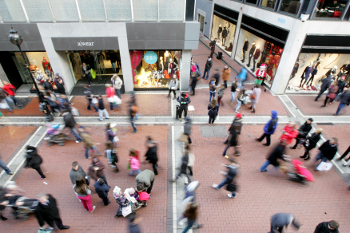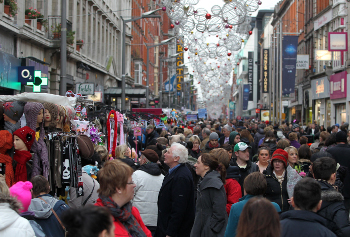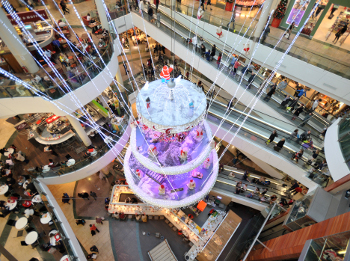State of play in the retail sector

While there are reports that retailers in general had a lucrative Christmas, word on the ground is that things may not be quite as rosy as we are being led to believe. Fionnuala Carolan reports
16 January 2013
The weekend before Christmas was said to have been a bumper shopping day in the republic and the busiest recorded in over five years which was a welcome piece of news indeed. There were also reports of healthy post-Christmas sales and of a 10% increase on last year. But before we start popping the champagne we need to remember that one or two good days of shopping, does not take a country out of a deep recession or restore public confidence, and we will have to wait until the official Central Statistics Office (CSO) figures for December are released to find out how well we really fared.
Disappointing CSO figures
Just as the news of strong Christmas trade was being discussed, the CSO figures for November were released and they revealed a different picture. The figures showed a slump between October and November, with certain sectors badly hit such as electrical goods down by 17.8%. With motor figures excluded, the volume of retail sales recorded a monthly decline of 1% compared to October.
Retail Excellence Ireland blamed the drop in sales between October and November on "aggressive" pre-Budget leaks which had consumers "running scared".
The organisation’s CEO David Fitzsimons said: "The kite flying for Budget 2013 did not help retail sales or consumer sentiment and caused many consumers to postpone their spend." Whether this postponement of spend, was made up in December will only be clear when the official figures are released.
Retail Ireland also said that these figures were disappointing, given the recent positive figures for previous months. The group said the domestic economy remains fragile and warrants special focus from government, particularly in rebuilding consumer confidence. Retail Ireland director Stephen Lynam commented: "November was tough for retailers, and particularly disappointing given the positive figures in recent months. Although we saw department store sales increasing by 9% year on year, this month saw falls in sales of furniture, books, clothing and hardware. These figures show the difficulty the retail sector faces.
"Luckily, tentative indications show that the Christmas period may have provided a welcome boost. Many Retail Ireland members reported positive results over the last few weeks, and our business sentiment survey from December shows retailers are more positive for the future.
"However, total retail sales are down about 25% since the start of the recession and 50,000 retail jobs have been lost. The government must continue to re-build consumer confidence so that a sustainable recovery can take place."

Grocery market figures
According to the latest grocery figures when going to press (12 weeks ending 23 December 2012) from Kantar Worldpanel in Ireland, growth across the grocery market remains subdued at just 0.3%; this is despite an increase in price inflation to 5%.
However there was good news for Dunnes Stores in that it increased its share from 23.9% to 24.3% and posting sales growth of 1.9% – well ahead of the market growth rate of 0.3%.
David Berry, commercial director at Kantar Worldpanel said: "The strong performance of Dunnes comes after a prolonged period of under-performance, with market share hitting a low point of 21.4% in September. The boost in share over Christmas has regained some of this lost ground and places the retailer in a more competitive position for 2013."
"One of the biggest factors influencing the price of groceries is the poor growing conditions seen during the summer of 2012. Vegetables are an important part of the grocery basket, particularly in the run up to Christmas, and we have seen some sharp price increases. With an extra €17m spent on Christmas ‘must haves’ like sprouts and potatoes, there has been less of the household budget available for ‘treat’ groceries such as soft drinks and confectionery."
Among the other retailers, Aldi continues to post growth of 30% and its share has overtaken Lidl for the first time, becoming the fourth ranked grocery retailer in the state. Despite this milestone there is evidence that shoppers have again shifted some of their spending back to traditional supermarkets over Christmas. Aldi and Lidl achieved a combined 12.6% market share in October, with this dipping to 11.9% in the latest month.
Elsewhere, Tesco and SuperValu have both performed broadly in line with the market, with Tesco holding market share at 27.8% and SuperValu dipping marginally to 19.5%.
While figures for the multiples and the discounters were not too disappointing, the smaller retailers including all the independents and convenience stores across the country did not fare so well. They fell from 12.6% to 11.4% in that period and we must not forget that these small retailers account for about 85% of all shops in the country.
A retailer from the midlands who owns a very strong and long-standing c-store rang ShelfLife this week to air his frustrations about the figures being quoted in the media recently about the retail sector which he felt did not represent him or any other small retailers in his area at all. These are the people who are at the centre of rural communities that have high levels of unemployment and a dearth of young people and new business due to immigration. This particular retailer felt that things were getting even tougher and the recent hikes in the price of cigarettes and wine in the budget will actually have a very real and very negative effect on his business.

Unemployment still a barrier to recovery
We can talk about green shoots and consumer confidence returning but while unemployment rates remain so high, it is difficult for the domestic economy to improve in any real form. The rate of unemployment is still at 14.6% despite there being a slight decrease in the Live Register figures in December. The seasonally adjusted register fell by 1,400 to 430,900 in December while those claiming benefits over the last year fell by 11,051.
However a breakdown of the figures shows long-term unemployed in December at 187,144, up 6,346 or 3.5% on this time last year.
Reacting to the latest CSO retail sales figures, the Irish Small and Medium Enterprises Association (ISME) warned that thousands of jobs will continue to be at risk unless serious action is taken to address issues impacting on the sector, particularly rising costs to businesses. ISME outlined that the decrease in sales figures clearly shows that the retail sector remains in a ‘distressed’ state. The association repeated its call for the immediate introduction of a Retail Strategy Group to address the rising costs to business.
ISME CEO Mark Fielding said: "It is high time the government took the threat to one of the most significant contributors to the economy more seriously.
"The government may state that exports will remain the only significant source of positive momentum in the economy over the next couple of years, and safeguarding and expanding the economy’s export base will remain a critically important objective of official policy, however they cannot be allowed to ignore indigenous retail and the 240,000 jobs involved."
Banks still not lending
Despite the many proclamations that the banks are ready and willing to start lending again, we are hearing different things. A retailer who had banked with AIB for over 30 years and cleared their mortgage was refused a loan for €14,000 to undergo some maintenance work on his store. If sums like this are being denied to the smaller retailer, they have little hope of building their businesses up and engaging in any sort of serious competition. Higher bank charges have been brought in by a number of banks including Bank of Ireland’s pre-Christmas hike of credit card interest rates so despite the claims, getting access to finance is still difficult to come by and continues to thwart growth.
Positive figures for export market
Despite the CSO figures, IBEC’s Q4 sentiment survey revealed that business confidence is improving, after falling back during the middle of 2012. The outlook for exports rose significantly, and while domestic sales expectations remain modest, they are better than this time last year.
According to new figures released by Bord Bia this week, the value of Irish food and drink exports in 2012 surpassed €9 billion for the first time. Exports are currently valued at €2 billion, or 28%, ahead of 2009 levels.
The strongest performing categories were meat and livestock (€3 billion), seafood (€493 million) and beverages (€1.26 billion).
The weakening of the euro relative to sterling is said to have helped boost trade to the UK, where the value of exports increased by 5% (€170 million) to reach €3.8 billion, representing 42% of total Irish food and drink exports in 2012.
Commenting on the figures, Aidan Cotter, chief executive, Bord Bia said: "Despite falling global commodity prices, lower output in some sectors and the continued weakness in consumer spending in established markets, the Irish food industry has delivered another robust export performance. The continued diversification into new and emerging markets, benefitting further from favourable exchange rates, should be welcomed with exports to Asia up by 75% since 2010."
While our export market is strong, and we are praised worldwide for the high quality of food we produce, we are still importing a lot of our food product and paying dearly for it.
Food prices still high
According to the World Bank, food prices are 7% higher than a year ago. The price of grain and other basic food commodities remains high making it tougher to discount on certain products.
Other figures released by the CSO earlier this year showed that food imports in 2011 increased by almost 10% to reach just under €5 billion, a good chunk of this is from Britain. Maybe, if we produced more for our home market and imported less, it would keep more money circulating in our economy and help support local businesses.
So while we don’t like to start the new year on a negative note, the reality of doing business in Ireland leaves a lot to be desired and while the government and the banks may try to put up a positive front, there are many businesses suffering badly.
It’s easy to look at the retail sector as a whole and believe that things may be improving but a small rural shop owner cannot be compared to an international clothes retailer like Topshop or department stores like Brown Thomas. Support for small business is imperative if the economy is to recover this year. The time for action is now.



 Print
Print






Fans 0
Followers